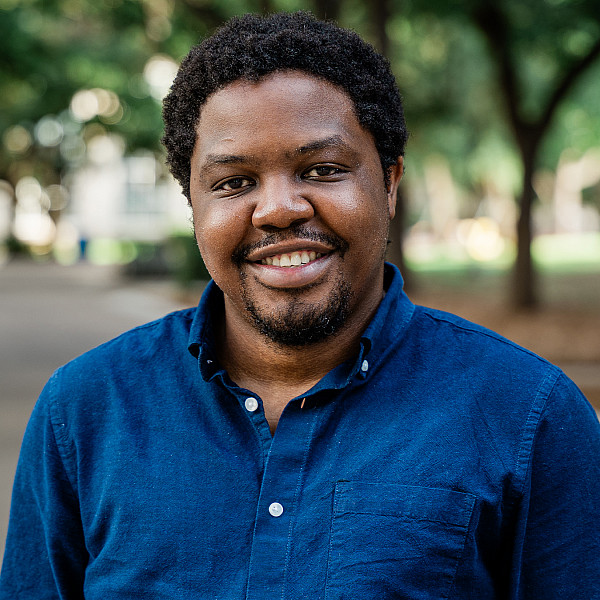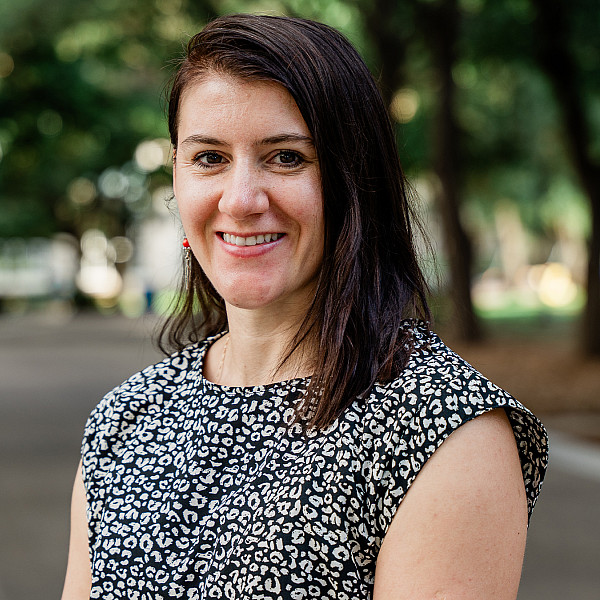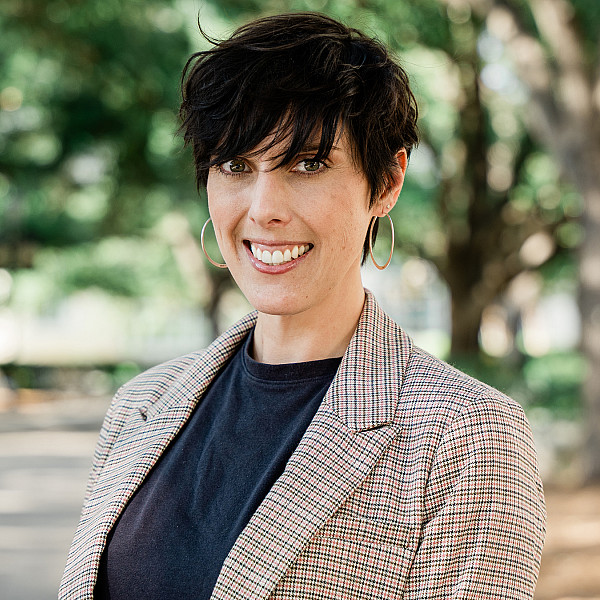News
Meet Our World-Class Faculty: Meagan Solomon
A conversation with Assistant Professor of Feminist Studies Meagan Solomon.
March 14, 2024
March 14, 2024
Open gallery

Could you introduce yourself and tell me a bit about your background?
My name is Meagan Solomon. I’m a faculty member in Feminist Studies who specializes in Latina/e lesbian literature and women of color feminisms. I come into this work as a Chicana Jewish lesbian raised by a family of chingonas (badass women). I’m originally from Arlington, TX, where I completed my B.A. in English with a minor in women and gender studies at UT Arlington. I later earned my Ph.D. in English with graduate certificates in Comparative Race and Ethnic Studies and Women and Gender Studies from TCU. On a personal note, I love animals (especially cats), astrology, art, and poetry.
What sparked your interest in feminism, and why did you want to become a professor?
As I shared, I was raised by a family of fierce women who always supported me and my dreams. Even when the word “feminist” wasn’t explicitly named, these maternal figures helped model feminist practices of care, confidence, and self-advocacy. I grew up with a strong respect for the roles women serve in my family, especially those that often go unnoticed or undervalued. (Shoutout to my mom, nana, and five aunts!) I was also lucky to take a class in high school focused on women’s literature, which inspired me to study feminism more deeply at the college level. Prior to beginning my studies at UTA, I was a community college student at Tarrant County College, where I was part of an organization called The Historical Underground. Co-organized by three TCC history professors, this organization created an important space for students to openly ask questions and discuss histories that are often marginalized in mainstream classroom spaces, including those of people of color and LGBTQ people (and those at these intersections). My passion for social justice work grew even more when I transferred to UTA and took courses on reproductive justice, queer studies, and LGBTQ literature. I knew that I wanted to continue cultivating educational spaces centered on intersectional justice, and becoming a professor in Feminist Studies has enabled me to do just that.
Are you currently working on any research, if so, what is it?
I am currently researching Latina lesbian legacies of resistance within the realms of literature, art, and activism. I am especially interested in how Latina lesbians have historically rejected and reimagined machista (heteropatriarchal) standards and expectations in their work. Some of the Latina/e lesbian writers, activists, and artists I’m researching include Jeanne Córdova, tatiana de la tierra, Lydia Otero, and Ester Hernández—all of whom contribute to a long legacy of radical self-expression and community advocacy.
How did you hear about Southwestern, and why did you want to work here?
One of my childhood friends actually attended Southwestern and double majored in religion and feminist studies. When I told her I was applying to work here, she was incredibly enthusiastic about her SU experience and expressed that I would make a great addition to the faculty here. (Thanks, Marianne!) When I had my interview, it was very clear that the Feminist Studies Program was the right place for me. I am especially grateful for the Feminist Studies Committee, including Drs. Brenda Sendejo, Ken Mello, and Elaine Craddock, who immediately welcomed me with such sincerity and care. I was also drawn to the small size of SU and the ability to form meaningful connections with students and my thematic hire faculty cohort, including Drs. Sonia Del Hierro, Amanda Hernandez, Adriana Ponce, Bryan Kauma, and Alexander Goodwin, who have quickly become my campus besties. When I was greeted by some of the campus cats during my initial visit, that further confirmed that I was in the right place.
What classes do you teach?
I currently teach Intro. to Feminist Studies, which is open to all students and offers an introduction to the field of feminist studies with a focus on intersectionality. I also teach Latina Lesbian Literature, which explores the diverse works of Latina lesbian writers and contributes to English, Race and Ethnicity Studies, and Latin American and Border Studies. This spring, I’m teaching Radical Women of Color, which is inspired by the 1981 anthology, This Bridge Called My Back: Writings by Radical Women of Color. This course also contributes to Race and Ethnicity Studies and focuses on the works of women of color committed to radical social transformation, intersectional feminist justice, and decolonization.
Is there a specific person or feminist theory that’s your favorite to teach and why?
Audre Lorde is my favorite feminist thinker and writer of all time. Her essays are my favorite to teach because they never fail to inspire students (or me) to embrace the power of community, difference, and intersectional analysis. Some of my favorite essays of hers include “Poetry is Not a Luxury,” “The Uses of Anger: Women Responding to Racism,” and “The Master’s Tools Will Never Dismantle the Master’s House.” I encourage everyone to read these and her entire body of work!
What do you enjoy doing outside of work?
I admittedly have indoor cat energy, so my favorite thing to do is spend time at home watching TV or reading while cuddled up with my cats. I am also known to frequent bookstores, thrift shops, art galleries, and vegan restaurants. As a community organizer, I enjoy learning and working alongside folks committed to building a world free from imperialism, occupation, and oppression. This is where I feel the most energized beyond the classroom.
What is something students would be surprised to learn about you?
Given my work as a lesbian feminist scholar and educator, students might be surprised to know that I watch reality TV shows like the Bachelor, Love is Blind, and Love Island. I find them very entertaining, despite their not-so-feminist, heteronormative content. (I contain multitudes!)
Is there anything I haven’t asked that you would like people to know about you?
I am planning to develop a publicly-engaged digital project focused on intergenerational connection and collaboration between Latina/e lesbians. This project will include community conversations with Latina/e lesbian writers, activists, artists, and scholars as well as a literary magazine devoted to Latina/e lesbian voices. I hope to invite students to participate in this project, so please stay tuned!

















